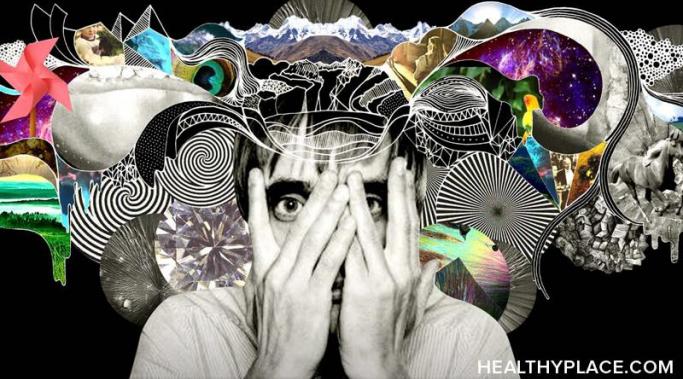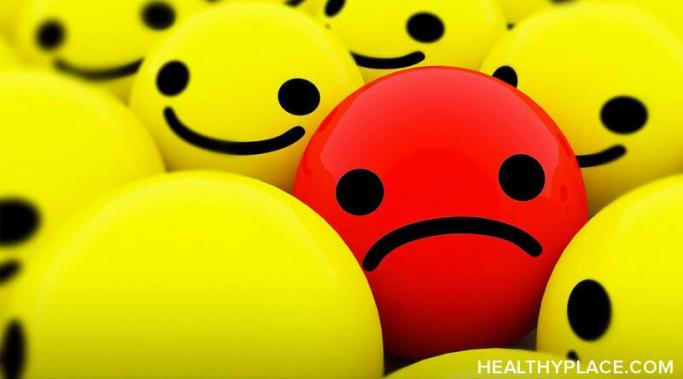Blogs
Coping with rejection is difficult for most people, but it can be especially painful for those of us who have depression. We tend to internalize things so rejection often leaves us feeling as if we've done something wrong or plagues us with incessant negative thoughts. So, how can we accept the experience and begin coping with rejection in a healthier way?
I'm tired of feeling sorry that I have bipolar disorder. I don't mean feeling sorry for myself -- that's a different thing -- I mean feeling sorry for the very fact that I am sick. I mean feeling sorry for the very fact that I am the one with the serious mental illness. And this feeling sorry about bipolar disorder is wearing on one's being. I, for one, don't want to feel sorry that I have bipolar disorder anymore.
I know I write a lot about how my family helps me cope with my schizoaffective disorder, but it's important to have friends, too. A lot of my friends live in different parts of the country or are really busy with their children while my husband Tom and I are childfree. Also, it doesn't help that I have a tendency to isolate. But I do have an old friend from high school with whom I'm still close and we go out for tea or coffee almost every week. Her name is Casey, and seeing her really helps me cope with my schizoaffective depression.
Living with your parents as an adult is more popular than ever before. Around 20 million young adults (aged 18-31) in the US live with their parents. In the UK, over a quarter of adults aged 20-43 still live at home. And the figure is even higher in Canada, with nearly half of young adults having this living with their parents.
I am constantly testing my limits in mental illness recovery. I’ve always been an ambitious person – before as well as after receiving my diagnosis. I’m usually walking a fine line between barely holding it together and being symptomatic. I tolerate the occasional hallucinations just to continue with my busy life. I don’t want to give up anything. You only get one life and that’s it, so I plan to live it to the fullest and keep testing my limits – mental illness or not.
I have a slew of insights about understanding eating disorders for family and friends, but I often don't have the language to communicate it all. I suspect that I'm not alone in this predicament. My hunch is most people with disordered eating issues struggle to attach words to their experience. Because eating disorders are complex illnesses that oppress the body, mind and spirit, they are painful to discuss. And their secretive, withdrawn nature can make people on the outside feel confused, wounded or even angered. They might perceive the eating disorder sufferer's actions as callous, apathetic, disingenuous and selfish. But while eating disorders do perpetuate this kind of behavior, it's not indicative of the person's true character. Underneath that hard, stony facade is someone desperate to feel accepted and validated. So I need understanding--understanding about eating disorders from family and friends—and if you can relate, I encourage you to use these talking points with your loved ones too.
Though there are many benefits to positive thinking, certain kinds of positive thinking can be detrimental to those with attention-deficit/hyperactivity disorder (ADHD). I found this kind of thinking particularly harmful at the beginning of my ADHD journey, when I had not fully accepted the condition. Even now, blind positive thinking can lead to self-deprecation, anxiety, and depression
Making new habits to cope with anxiety is an important part of anxiety self-help. By establishing routines, we can take on more in our lives without feeling overwhelmed. However, attempting to change too much at once can end in disappointment. Working on making new habits too quickly can fuel anxiety rather than help it.
I'm not dangerous, although some people think people with mental health disorders are dangerous -- especially, it seems, when it comes to dissociative identity disorder (DID). A diagnosis of DID can bring about a lot of changes. The person can feel different, sometimes better, knowing that they have a diagnosis, and sometimes worse, knowing that the diagnosis is not an easy one. Treatment can include a variety of medications and really difficult, intense therapy. Then there are the changes that you experience from people on the outside, some of whom don't believe I'm not dangerous. While many people are supportive, there is no denying that a DID diagnosis comes with a tremendous stigma that can change a person's life forever.
If you struggle with depression, you may need some tips for getting out of bed. Have you ever felt so depressed that it's hard to even get out of bed in the morning? Although I have gotten so much better with managing my depression, I have days like this all too often. In fact, this is the way depression affects me the most. Read this article to learn some tips for getting out of bed and what I do during these tough times.









